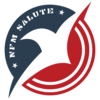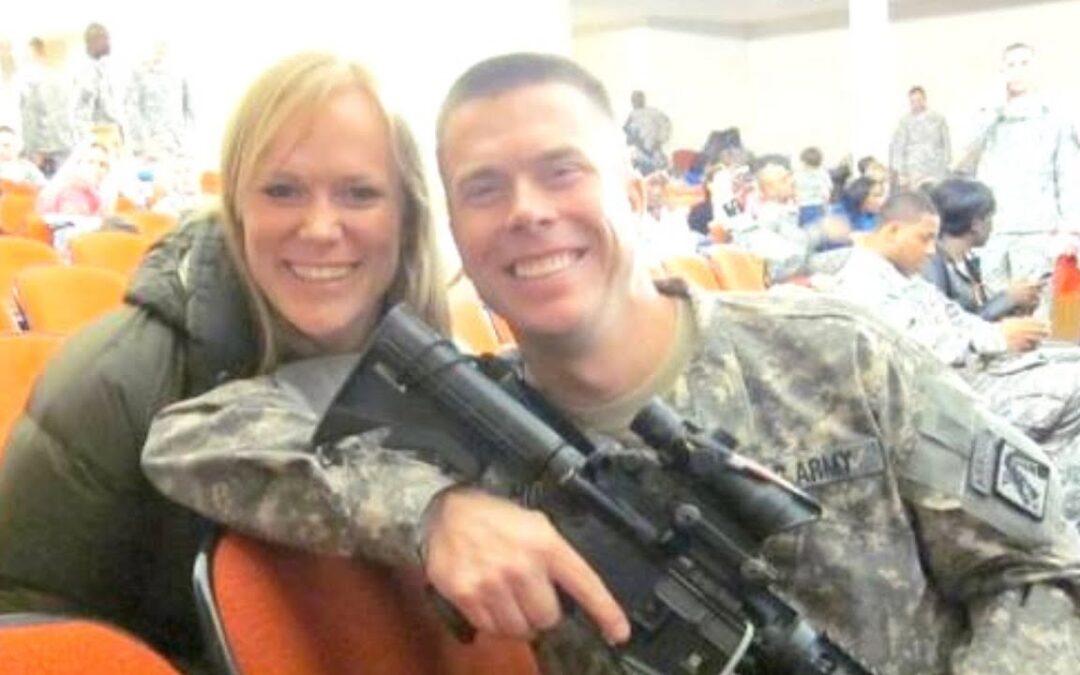NFM Lending is pleased to honor Major Hugh Murray as the NFM Salute for February 2021.
Murray is a native of Houston, TX, where he grew up with his siblings, Dirk and Jayna. The men in Murray’s life carried a legacy of military service —his grandfather fought in WWII, his father served in Vietnam with the U.S. Army, and his uncle was in the U.S. Navy. Being surrounded by these proud Veterans with incredible experiences made him interested in serving, too. After graduating from law school in 2006 and building his legal experience in the field, Murray decided to combine his passion for law with his strong respect for the military by joining the U.S. Army as a Judge Advocate in 2009.
Murray started out his career with the XVIII Airborne Corps out of Fort Bragg, NC. In January 2011, he volunteered to go to Iraq as the Chief Legal Advisor for Detention Operations. During his deployment, U.S. troops were preparing to leave the country. Murray remembers, “There was a lot of activity and the workload was heavy. But it was also a scary time for me. I had never been in a war zone; I had never experienced anything like that. It was very different, but I was also excited and motivated to do my job while I was deployed.”
In April 2011, he received the shocking news that his younger sister, Jayna, had been brutally murdered while working at a store in Maryland. After returning home for the funeral and dealing with the pain of Jayna’s death, Murray was given the option to take a bereavement period or return to his overseas duties. For Murray, it was an easy choice. “I joined the military to serve, I joined the military to deploy if asked,” he said. “I wanted to go back to support those commanders that I was providing legal advice to. I wanted to go back because of the fellow soldiers and Judge Advocates that I was working alongside. I wanted to go back because that’s what Jayna would have wanted. It’s what I wanted. As difficult as it was emotionally to leave my family in such a distressful time, I also had an obligation and I wanted to live up to that obligation.”
After finishing his mission in Iraq in August 2011, Murray returned to the U.S. and served in various legal capacities in North Carolina and Virginia. Among other titles, he has held the positions of Command Judge Advocate, Company Commander of Juliet Company, 262d Quartermaster Battalion, and Field Screening Officer. In 2019, he stepped down from a full-time career in the military to join the Army Reserves as a part-time Judge Advocate. He currently works as the Deputy General Counsel and Chief Ethics and Compliance Officer for a consulting firm.
Murray lives in Richmond, VA with his wife, Kate and three children. He continues to support various causes in memory of his sister as a board member for The Jayna Troxel Murray Foundation.
NFM Salute is an initiative in which one military member or Veteran is chosen each month to be honored as the “Salute of the Month.” Salutes are chosen from nominations on the NFM Salute website, www.nfmsalute.com. The “Salute of the Month” will be featured on the website with a biography and information about his or her service, and NFM Lending will donate to a non-profit in the Salute’s name.
NFM Lending is proud to donate $5,000 to The Jayna Troxel Murray Foundation on behalf of Murray. NFM looks forward to the opportunity to continue to honor military and Veterans through the NFM Salute initiative.
Full Transcript of Video Interview is Below:
– When Army Major Hugh Murray entered the service during wartime in 2011, he was fully aware of the life-and-death dangers he faced. What he never thought he’d have to contend with while overseas was tragic loss of life at home. In a story that shook the country almost 10 years ago to this day, Murray’s sister Jayna was brutally murdered in March of 2011 while working at Lululemon in Bethesda, Maryland. Our February 2021 NFM Salute honors both Hugh and the memory of his sister Jayna. And joining us now from his home in Richmond, Virginia is Hugh Murray. Hugh, thank you for being with us on NFM TV and agreeing to be our NFM Salute for the month of February, 2021.
– Thank you, Greg.
– Let’s jump right into your military service. What inspired you to serve?
– I have come from a long history of family that have served in the military. My grandfather served in the Air Force in World War II, my dad was in the Army in Vietnam, and my uncle served in the Navy. Kind of brought me up in a mindset of wanting to serve in the military.
– You took the path of Judge Advocate. I guess you wanted to serve and you wanted to be a lawyer at the same time, so how do those two kind of latch onto one another?
– So I graduated from law school in 2006, and I still had high ambition to serve in the military. And so, as a Judge Advocate, I’m a uniformed soldier, but I provide legal advice to commanders and soldiers.
– So in 2011, you were deployed to Iraq. And what do you remember about those first few months before you were called back home?
– It was a transition period for the United States as we were starting to withdraw from Iraq. The workload was heavy, but it was also kind of a scary time for me. I’d never been in a war zone, I’d never experienced anything like that, but I was also excited and motivated to do my job while I was deployed.
– And you were prepared for anything, right? I mean, you put your life in harm’s way and you knew that you might give your life for your country. And obviously you were at peace of mind with that, but what you weren’t expecting was tragic loss of life at home. Talk to us about that experience of getting that phone call that your sister Jayna had been brutally murdered back in the States on March 11th, 2011.
– The Judge Advocate that was in charge of all of Iraq, he said, “Your sister is dead,” and then he went ahead and explained that she had been murdered and that they were gonna do everything that they could to get me back to the United States to be with family.
– After that long journey back to the United States, one of the first things that you did when your father David and your mother Phyllis picked you up from the airport was travel to the site of the murder, to Lululemon. And outside, there was a makeshift memorial, that we’re looking at right now. What were the emotions like when you pulled up and saw that groundswell of support from the community in that manner?
– It just felt very unreal, just because we never expected to be in a situation like that. We never sought out that public attention. And yet at the same time, we wanted to visit that site, the memorial, to feel close to her, and in a certain way, I guess, provide her support, because we were very unclear. While we had some information, we were still very much in the dark about what had happened, how it had happened, no different than the community. Everybody was very much curious about how something like this could happen. But it was beautiful to see the flowers and everything that people were leaving, and the notes and everything. We read every single note, picked ’em up, looked at ’em. Sorry, it was a very emotional visit, and it still brings out a lot of emotions in me.
– And Jayna was so intelligent, so gifted. She graduated from GW, she was in a graduate program at Johns Hopkins University at the time, and she always stood for what was right. And in this moment, when a coworker of hers was caught stealing something in Lululemon, she stood up and she did what she thought was right. I take it you weren’t surprised, knowing Jayna and her DNA, that she was trying to do the right thing.
– She was, absolutely, and it was no surprise to any of us that she would have identified the issue, the theft, and addressed it.
– And her coworker was convicted of murder. She’s now serving a life sentence, but I wanna focus more on the life of Jayna, because she was a real beacon of light. She would have been 40 on November 22nd, and I know you’re making it sort of your life’s mission to continue her legacy. Talk to us about some of the things that she loved to do, that enabled her to light up the world.
– She just loved life. If there was something going on, she wanted to participate. She did not like sitting back and watching. So if somebody was going dancing, she was there to dance the flamenco. If somebody wanted to run a marathon, she would be right there running right next to ’em. She absolutely just participated in life.
– And Hugh, you’ve got three children, three, five, and seven, so I know they’ve heard all about Aunt Jayna. Tell us about the distant relationship that they have and how they carry that memory and that legacy within.
– My wife and I talk a lot about Jayna, and how she is their Tia T, that’s how they refer to her, and we hope to instill in our three kids that love of life and the love of education, and it really breaks me to know that my kids will not know their Aunt Jayna. And so it’s really hard to kinda enumerate all the things that I miss about her.
– Hugh, you had a choice after Jayna’s funeral to continue your service overseas in Iraq and Mosul, and continue the unwind of military forces there, or to stick back and just stay with your family. You chose to go back. Why did you do that?
– I wanted to go back because that’s what Jayna would have wanted. It’s what I wanted. And so, as difficult as it was emotionally to leave my family in such a distressful time, I also had an obligation, and I wanted to live up to that obligation.
– There’s a story about a box that was sent from your sister to you in Iraq, and you only realized it after her passing. Share with us that story.
– Just days before Jayna was murdered, she had sent me a care package, and she didn’t tell me about it; it was gonna be a surprise. And so I had not received it. Upon returning after Jayna’s funeral, they had set aside a package that had arrived while I was back in the States. And so I was able to receive a care package probably a month after Jayna had sent it to me. I’m a distance runner; I enjoy running. And so it was a running shirt and a hat. Put those on, those items on, and I’ll go out for a run, and it provides me that little bit of extra warmth, that memory, that connection.
– Well, her legacy lives on, and now more people know about what a vibrant, beautiful, intelligent person Jayna was. And you set up the Jayna Troxel Murray Foundation, which supports and promotes the interests and passions that enriched Jayna Murray’s life.
– We really wanted to try to distill down some of the more impactful things that she did in her life that really gave her direction and purpose. And so, much of it is education. So her education at GW, like you mentioned, her continuing education at Johns Hopkins, we’ve set up scholarship funds for those two institutions in Jayna’s name. And then we’ve also provided funds for scholarship to a couple of the other camps and dance facilities that Jayna participated in.
– Typically, when we have NFM Salutes, we donate $2,500 to the charity of your choice, being the recipient, but today, since we’re honoring both you and the legacy of Jayna, we’re going to double that. It’s two people, so we’re going to donate $5,000 to the Jayna Troxel Murray Foundation. It just means so much to us that you served, and we share your loss.
– I truly appreciate that. That’s gonna do a lot to support our foundation. Thank you.
– That is Army Major Hugh Murray. He is our February NFM Salute. I’m Greg Sher. We’ll see you again next time.



